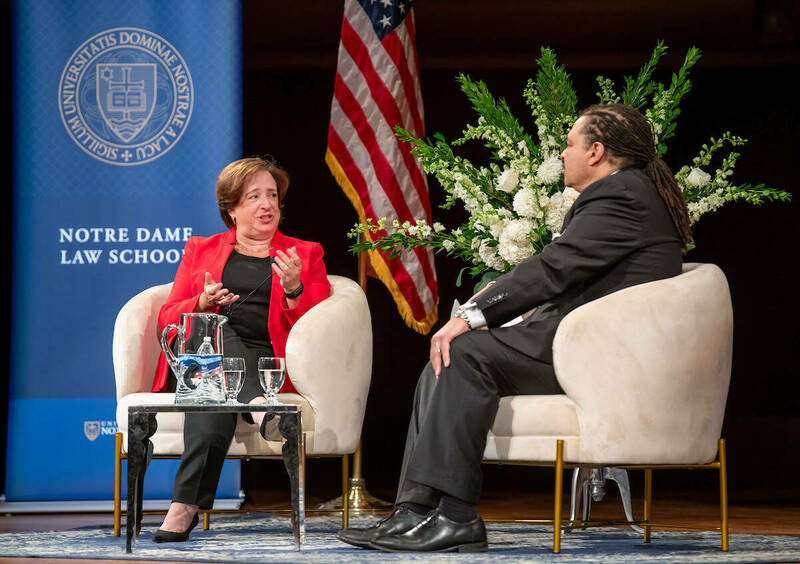 Justice Elena Kagan in conversation with Notre Dame Law School Dean G. Marcus Cole. Photo by Barbara Johnston
Justice Elena Kagan in conversation with Notre Dame Law School Dean G. Marcus Cole. Photo by Barbara Johnston

U.S. Supreme Court Justice Elena Kagan said Friday, September 21, at Notre Dame that the high court should adopt a code of ethics.
“We’ve committed to following the gift rules that other judges follow and the outside income rules that other judges follow. But other judges have a very extensive code of ethics that governs everything that they do,” Kagan said in response to a question from Notre Dame Law School Dean G. Marcus Cole about whether the court needs a code of ethics.
While the Supreme Court is unique and some of the rules would not fit as well as at lower-court levels, it can be accomplished, the justice said.
“What we could do is just adapt the code of conduct that the other court systems have, in order to reflect those slight or certain differences. And I think it would be a good thing for the court to do that. It would help in our own compliance with the rules, and it would, I think, go far in persuading other people that we were adhering to the highest standards of conduct,” Kagan said.
The topic of Supreme Court ethics, including recusals, gifts and potential conflicts of interest, has been much in the news in recent years. Kagan’s comments came on the same day ProPublica reported that Justice Clarence Thomas had twice attended annual summits for donors of the Koch network, a conservative political network founded by billionaires Charles and David Koch. Kagan did not mention the news report.
Her remarks came during a public conversation with Cole, the Joseph A. Matson Dean of Notre Dame Law School in the Leighton Concert Hall in DeBartolo Performing Arts Center. It was the first in a series of events for the 2023-24 Notre Dame Forum. This year’s theme is “The Future of Democracy.”
Kagan was nominated to the Supreme Court by President Barack Obama in 2010, and that year she became the 112th justice and fourth woman on the court. She previously served as the solicitor general of the United States, dean of Harvard Law School and as associate counsel to the president and deputy assistant to the president for domestic policy in the Clinton administration.
Kagan is the seventh of the nine currently serving Supreme Court justices to visit Notre Dame in recent years. The others who have visited are: Amy Coney Barrett ’97J.D., Clarence Thomas, Chief Justice John Roberts, Samuel Alito, Brett Kavanaugh and Sonia Sotomayor. In addition, the late Justice Ruth Bader Ginsburg visited Notre Dame while serving on the court.
Following are selections from Kagan’s comments:
On ways law schools and undergraduate institutions can combat “cancel culture” and create an environment where people feel free to speak their minds:
There’s too much disrupting speakers. There’s too much banning books. There’s too much trying to insulate yourself from ideas with which you disagree all around us. And it is on both sides of the political spectrum, and it’s wrong and it’s counterproductive for our democracy and our society.
Our democracy, this nation can’t work and can’t do the things that it needs to do unless people can talk with each other and can really try to understand each other and learn from each other and try to put their heads together and work for a common good — which presumably we all want (for) this nation to prosper. And it’s not going to happen unless people work together across various disagreements, profound as they might be.
It’s especially important in educational institutions. Educational institutions are supposed to be about learning and about exchange and about engagement with ideas, including ideas you don’t like. If nothing else, nobody has ever managed to persuade a person who they don’t understand. So put yourself in another person’s shoes and try to figure out where that other person is coming from and why she thinks what she thinks, if nothing else, in order to persuade that person.
Cole: In your confirmation hearings in 2010, you famously said, “We’re all originalists.” Can you explain what you meant by that and is it still true?
Actually, that’s only part of the sentence. . . . It came after a long discussion about why I was not an originalist in the conventional understanding of that term, but instead why I thought that constitutional meaning evolved (and) developed over time, and why that was consistent with what the framers wanted and consistent with the documents that they gave us.
No, I’m not an originalist, as some people would define it, but in fact, my view that constitutional meaning evolves is consistent with the actual original understanding of what the document was meant to do and how it was meant to work.
Kagan is the eighth Jew to serve on the U.S. Supreme Court. On the role of religious faith in her life and her career:
It’s truly important in my life. I’m Jewish, a practicing Jew. . . . My Judaism is important to me as a human being. I try not to make it important to me as a judge. I try to keep the one thing separate from the other.
It would be improper for me to substitute my personal morality for the legal rules that I'm supposed to enforce for the provisions of law that I’m supposed to interpret. So being Jewish is super important to my life, but I hope that being Jewish is of no importance to my judgment.
Margaret Fosmoe is an associate editor of this magazine.